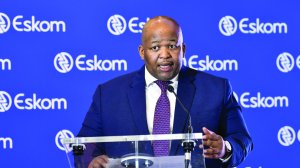Eskom CEO Dan Marokane has appealed for the State-owned utility to be given “space” to implement its renewable-energy strategy, insisting that it is not designed to “crowd out” private competitors and is in line with the country’s Just Energy Transition strategy of protecting vulnerable coal workers and communities.
Speaking during the signing of a memorandum of understanding with Exxaro aimed primarily at helping to support the coal miner to reduce its Scope 3, or indirect, carbon emissions, Marokane also stressed the utility’s renewables strategy would be pursued in partnership with the private sector.
Eskom has issued a tender seeking private partners for a separate ‘Renewable Energy Business’, to accelerate the deployment of renewable-energy solutions, primarily on land surrounding its coal-fired power stations.
The tender indicates that the utility is seeking to partner with entities with proven credentials in establishing renewables businesses in South Africa, including participation in at least three independent power producer (IPP) reference projects.
“The objective for the new subsidiary will be to operate independently of the main Eskom entity to allow for greater governance agility, competitive market positioning, and enhanced public-private partnerships for a period of 12 months,” the tender, which was issued on April 9 with a May 7 closing date, states.
Marokane dismissed concerns about Eskom’s ability to compete fairly and cost-effectively with IPPs, saying it had already earmarked 2 GW of near-term opportunities to be pursued in partnership with the private sector.
“We will do this with others on our lands, with our people who are skilled and will also leverage the balance sheet of others to de-risk ourselves going forward.
“So we've entered an era of partnership, and it’s a space that Eskom has to play in,” he said, adding that it had been studying similar moves by other global utilities that were also moving into renewable energy.
“There is no reason why we should be questioned as to why we should be playing in the space and not giving it to others.
“We have a 42 000-person workforce that needs to be transitioned.
“It's our responsibility to ensure that when we transition we are actually transitioning our workers for their livelihoods going forth,” Marokane added.
He also argued that Eskom had hitherto not been allowed to participate in the renewables sector, but that its shareholder and board had now cleared a path for it to do so, using a workforce that was capable of doing so and a business model that was agile and competitive.
“I know that this question is sometimes being asked because we are being seen like we're crowding out the private sector.
“Eskom is a State-owned entity and it needs to focus on the requirements of everyone in the country, and we bring along this part of our business to ensure that, in our provision of electricity to South Africans of all walks of life and affordability, nobody's left behind.”
Meanwhile, Eskom was also considering ways to extend the life of its existing coal stations beyond the decommissioning dates outlined in the current version of the Integrated Resource Plan, which was recently used as the basis for another air-pollution exemption announced by Forestry, Fisheries and the Environment Minister Dr Dion George.
On March 31, George announced that two of the stations, Duvha and Matla, had been granted exemptions until their decommissioning dates in 2034 while Kendal, Lethabo, Majuba, Matimba and Tutuka were granted five-year exemptions until April 1, 2030.
The new Medupi power station, meanwhile, was granted a five-year exemption until April 1, 2030 to achieve full air-pollution compliance, implying the possible retrofit of flue gas desulphurisation by that date.
Marokane refused to be drawn on any changes to the decommissioning schedule, saying only that Eskom had 30 days to respond to George’s decision and that it was preparing a “comprehensive” response.
Meanwhile, George welcomed the issuance of the Eskom tender to establish a separate renewable energy business unit, describing it as a significant step that reflected Eskom’s dedication to accelerating renewable-energy deployment and supporting South Africa’s transition to a cleaner, more sustainable energy future.
“The Minister acknowledges Eskom’s proactive approach and calls for a transparent, competitive, and inclusive tender process that fosters opportunities for local and international expertise.
“The Department of Forestry, Fisheries and the Environment will closely monitor the initiative’s progress to ensure alignment with South Africa’s Nationally Determined Contributions, the 2050 net-zero emissions target, as well as the stringent conditions imposed on Eskom on 31 March 2025 that support compliance with the Minimum Emissions Standards,” the department said in a statement.
EMAIL THIS ARTICLE SAVE THIS ARTICLE ARTICLE ENQUIRY FEEDBACK
To subscribe email subscriptions@creamermedia.co.za or click here
To advertise email advertising@creamermedia.co.za or click here










